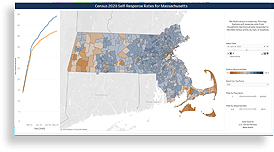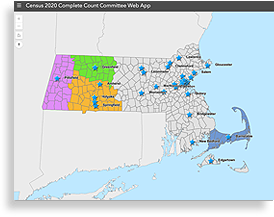Population Estimates Program: Projects and Initiatives
 The Population Estimate Program’s (PEP) goal is to ensure that the population estimates produced by the U.S. Census Bureau for Massachusetts are as accurate as possible and inclusive of the most up-to-date information.
The Population Estimate Program’s (PEP) goal is to ensure that the population estimates produced by the U.S. Census Bureau for Massachusetts are as accurate as possible and inclusive of the most up-to-date information.
PEP participates in several programs that ensure this accuracy. Our activities involve robust primary data collection, data analysis, communication with the U.S. Census Bureau, and preparation of materials to be submitted in accordance with Bureau guidelines. The program is organized into several major components including Population Estimates; Population Projections; Participation in the Federal-State Cooperative for Population Estimates; Group Quarters Survey; Housing Unit Review Survey; Technical Support for Census Challenges; and Decennial Census Preparation and Review Activities.
For more information:
Please contact Susan Strate at (413) 577-0753 or sstrate@donahue.umass.edu.
Population Estimates
PEP prepares independent population estimates as a check against the Census Bureau’s annual estimates for Massachusetts cities and towns. Our goal is to produce the most accurate population estimates for Massachusetts municipalities, using the most current component data available. The data we collect for this purpose is also shared with the U.S. Census Bureau’s Estimates Division to ensure their official estimates for Massachusetts geographies resemble ours to the greatest extent possible.
Our program also produces summary reports on U.S. Census estimates for Massachusetts geographies. These reports extract Massachusetts data from the most recent Census releases and put this information into a comparative context for Massachusetts researchers and planners.
Population Projections
By agreement with the Massachusetts Secretary of the Commonwealth, PEP has produced population projections for all Massachusetts municipalities at 5-year intervals to 2035, using a model developed by Dr. Henry Renski, Associate Professor of Regional Planning at UMass Amherst and the PEP team. Detailed projections are available for download by sex and 5-year age group for each city, town, county, and state region along with a summary report on the forecast method and the projected population growth in eight distinct Massachusetts regions.
PEP also produces specialized population projections on a contract basis, including enrollment projections; small-area, detailed population projections by age, sex, race, and ethnicity; and projections of special populations.
PEP is the official Federal-State Cooperative for Population Estimates (FSCPE) representative for Massachusetts and the formal mechanism by which the Commonwealth submits data updates, corrections, and challenges to the Population Estimates Division of the U.S. Census Bureau. Our goal is to ensure that the population estimates produced by the Bureau for Massachusetts are as accurate as possible and inclusive of the most up-to-date information available in our state.
Susan Strate, the PEP Senior Manager, serves as the liaison to the FSCPE, which allows for regular state interface with the U.S. Census Bureau’s Population Estimates Division. Many specific opportunities for the review of and input into Census Bureau estimates and components are made available to states only through the mechanism of FSCPE participation. Therefore, maintaining a liaison in this program is essential for states who wish to have a comprehensive influence over the accuracy and production of their official estimates.
Programs made available to states exclusively through FSCPE participation include the Count Review Program for by-block review of the Census Master Address File and the group quarters counts during the decennial Census; the Group Quarters, Housing Unit, and Vital Statistics Review programs, which allow state data input into official annual estimates; and opportunities to review county and sub-county population estimates before these estimates are officially released, allowing states to look for abnormal, unusual, and unexplained population changes. Other review or input opportunities also available to governments, but often facilitated or staffed by FSCPE liaisons, include Local Update of Census Address; Population Estimates Challenges to sub-county and county estimates; and the Count Question Resolution Program to correct census count data.
As an elected member of the seven-person FSCPE Steering Committee, the PEP Senior Manager is able to weigh in on how these review opportunities are made available to states, which review opportunities are most critical, and what changes are recommended by states within the programs. The PEP Senior Manager also leads the Data Input Subcommittee of the FSCPE, which works on issues of data submission and integration from states into the Bureau’s products. Finally, the PEP Senior Manager joined the newly formed FSCPE 2020 Working Group in 2017. The 2020 team consists of representatives from within the FSCPE Steering Committee, and various key divisions and offices within the U.S. Census Bureau's Decennial Programs Directorate. The core team is responsible for the identification and documentation of opportunities across the 2020 Decennial Census Program that will leverage the knowledge, experience, and expertise of the FSCPE community toward achieving the 2020 Census goals and objectives.
Group Quarters Survey
PEP conducts an annual statewide survey of persons living in group quarters (GQ) facilities in Massachusetts in order to obtain a current and accurate population count of these facilities. These updated population counts are a key input into the annual population estimates produced by the U.S. Census Bureau for Massachusetts and its municipalities. Since our first survey in 2007, PEP has verified a population of over 250,000 persons living in over 2,500 GQ facilities in the Commonwealth. This updated component data has been used to support numerous population challenges statewide as well as a direct input to the Bureau’s official estimates. GQ counts are alone responsible for increasing the official state population by over 50,000 since 2007. If the state does not collect and submit this data annually, the Census Bureau assumes no growth in the GQ population during the nine years following the Census count, making state-supported survey work critical to the maintenance of a full and correct count for Massachusetts.
Housing Unit Review Survey
Housing unit data constitute a critical update for the U.S. Census Bureau’s official annual population estimates. The Bureau’s housing unit estimates are used to distribute a county’s growth to its municipalities and are also used as a control for the American Community Survey and other Bureau estimates. Actual data on components like demolitions and adaptive re-use are not captured by the Census Bureau’s regular Monthly Building Permit Survey to cities and towns, but the FSCPE’s Housing Unit Review program provides an opportunity to supply these data and more accurately document residential growth in Massachusetts. Each year, PEP conducts a survey to all Massachusetts cities and towns requesting current data on building permits, mobile home placements, conversions, and housing unit loss. These survey results are submitted to the U.S. Census Bureau and are incorporated into their official annual estimates for each city and town.
The U.S. Census Bureau’s Population Estimates Challenge Program offers an opportunity for cities and towns to challenge their official annual population estimates by submitting additional data to the Bureau for evaluation. PEP provides technical assistance to cities and towns who have a demonstrated basis for an estimates challenge and, in many cases, PEP will initiate a challenge on behalf of a city or town based on information we obtain through our own research activities.
For example, in 2009, PEP initiated successful challenges for 16 municipalities, increasing the state population by 21,294 that year. Again in 2010, PEP initiated challenges for another eight Massachusetts municipalities, increasing the state population by another 22,150 persons. Finally, following the 2010 Census, PEP continued to provide support and technical assistance to additional towns needing to make corrections to their official Census estimates on an as-needed basis.
It is our intention that by providing the Census Bureau with current input data on behalf of municipalities and by conducting our own review of Census estimates before they are released publicly, fewer municipalities will need to make corrections to their official population estimates. Our annual Housing Unit Review and Group Quarters surveys both ensure that cities and towns have a chance to include their data in the Census Bureau’s estimates process before the estimates are finalized so that challenges based on those components are not needed. However, we encourage cities and towns who find a basis for a correction or challenge to their official estimate to contact our program for assistance.

 Census 2020 Self-Response Rates for Massachusetts
Census 2020 Self-Response Rates for Massachusetts
This interactive dashboard displays Census 2020 Self-Response Rates for Massachusetts through a mapping interface designed at the municipal and tract geographical levels. Using daily self-response data from the U.S. Census Bureau, this dashboard shows the response rates for cities and towns as they progress through the decennial census season. The Census tract layer also allows those interested to view the response rate progression of smaller populations within municipalities. To find out more about the 2020 Census Response Rates, or to view the technical documentation, visit the Census Bureau’s Response Rate webpage.
 Census 2020 Complete Count Committee Web App
Census 2020 Complete Count Committee Web App
The Census 2020 Complete Count Committee Web App is an interactive mapping tool developed to help citizens of the Commonwealth identify Census 2020 outreach contacts in their cities and towns. Individuals affiliated with organizations ranging from educational institutions, media outlets, and local religious groups are all encouraged to assist Census Complete Count Committees to identify populations in their communities that may be particularly difficult to enumerate. To find out more about Census 2020 Complete Count Committees visit the Massachusetts Secretary of the Commonwealth’s website.
Local CCC’s, can’t find your committee on this map? Please send your information or updates to: ma2020census@sec.state.ma.us.
Group Quarters Electronic Response
The Group Quarters Electronic Response (GQER) test is a component of the 2020 Research and Testing Study Plan conducted by the U.S. Census Bureau’s Special Enumerations Integration Team. It tests the quality of electronic submissions and supports the address frame for 2020 Census of Group Quarters population enumeration. Massachusetts was the only state to participate in this test, submitting data on 1,918 student housing and nursing home facilities around the Commonwealth.
Geographic Support System Initiative, Frame Development
The Bureau’s Geographic Support System Initiative (GSS-I) allows governmental entities to submit geocoded address data for review, validation, and inclusion in the Bureau’s Master Address File, ensuring that the maximum number of residential addresses will be in scope for Census 2020 operations. In fiscal year 2017, UMDI prepared and submitted 2.8 million geocoded residential addresses to the U.S. Census Bureau, using data from the MassGIS NextGen e-911 Master Address Database, the Level 3 Assessors’ Parcel Data, information from the Massachusetts Secretary of the Commonwealth, and other sources. The Bureau was able to add or correct spatial coordinates for over 1 million residential addresses in Massachusetts based on the UMDI submission.
Local Update of Census Addresses 2020
The Local Update of Census Addresses (LUCA) program provides an opportunity for tribal, state, and local governments to review and improve the address lists and maps used to conduct the 2020 Census. LUCA 2020 will allow participants to review the Census Bureau’s full address list for their geographic area. This is a full Title-13 address list review allowing participants to add, delete, change or correct an address, including the location of the address. In addition to address lists, the Bureau will also provide maps and geographic location data associated with addresses as well as address counts by census block. To support the state in LUCA participation, PEP is working closely with the Secretary of the Commonwealth in providing technical assistance to cities and towns. More details on the LUCA 2020 program may be found on the Census website.
To ensure a successful LUCA project in Massachusetts, UMDI and the Secretary of the Commonwealth’s Office combined information from the MassGIS E911 database, Assessors’ Parcel data, and de-personalized address data from the State Voter Address list to create an updated statewide residential address list, including detailed property use-codes and geographic coordinates. These LUCA-ready list were distributed to cities and towns around the Commonwealth to assist them in their review. In addition, the UMDI/SOC team conducted 14 regional and statewide Census 2020 LUCA Technical Training presentations in all regions of the Commonwealth, from Pittsfield to Barnstable, with approximately 400 city and town representatives registered statewide. Ultimately, the UMDI/SOC team submitted 100,454 residential addresses and 325 group quarters facilities that the Census Bureau had potentially missed or misplaced, with thousands of additional addresses submitted directly by the municipalities we supported.
Early Non-Response Follow-up Recommendations (Early NRFU)
Early NRFU specifically targets residential areas around colleges, where students may leave the area before the Census has had a chance to reach out to non-responders. UMDI completed an analysis to identify neighborhoods in our state that will benefit from Early Non-Response Follow-Up in the 2020 Census. We created a geodatabase that pulled in layers of college campuses; ACS and Census data on household, age, and enrollment information; digitized bus and MBTA routes; and de-identified student addresses from colleges and universities throughout Massachusetts. Applying buffer zones and criteria indexing, we ultimately identified 2,863 off-campus college blocks which we submitted to the U.S. Census Bureau for their consideration in their Early NRFU operations.
Group Quarters Address Frame
The 2020 Group Quarters Address Frame project allows state representatives from the Federal State Cooperative for Population Estimates (FSCPE) the opportunity to submit addresses, locations, and contact information for group quarters facilities and transitory locations on behalf of their states. The Massachusetts FSCPE representative from UMDI requested and advocated for this opportunity for all states with the understanding that while municipalities may submit their own group quarters addresses as part of the LUCA review, for some facility or location types statewide administrative resources and research can provide comprehensive information that might otherwise be missed. Addresses submitted through this project will be incorporated into the Census Master Address File in time for enumeration planning activities to be prepared by the Bureau for these locations. The GQ address frame project will be conducted from approximately March through August of 2019. FY ’19- ’21: Count Review Program
The Count Review Program (CRP) provides a last-chance opportunity for Federal-State Cooperative for Population Estimates (FSCPE) state liaisons to review the Census Bureau’s Master Address File before the official Census count day (for housing units) and after enumeration (for group quarters) so that missed addresses and facilities can be restored to the Census. UMDI participates in this project by assembling a statewide geodatabase of residential addresses and group quarters facilities for comparison against the Master Address File. For example, in the 2010 Count Review program, UMDI was able to restore 2,735 residential addresses and numerous facilities to the enumeration which would have otherwise been missed. According to the Census Bureau, as many as 1 out of 98 housing units was enumerated because of Count Review at the state level in Census 2010.
Preparations for count review operations, including training to state participants and the assembling of address lists, will begin in late 2018 (FY ’19), and the two review events will take place in January to February and June to July of 2020 (FY ‘20 and ‘21.) States can elect to participate in either or both of these review events, which are strategically designed to provide a realistic chance of identifying and correcting potential errors in each state’s census counts.
New Construction Survey
The U.S. Census Bureau typically conducts a New Construction Survey just ahead of the Census enumeration effort so that local governments can submit addresses or developments that have come online (or will be constructed before the April 1st Census count) since the LUCA review start period (March 2018). In areas of high growth, especially Eastern Massachusetts and the Greater Boston and Greater Worcester areas, capturing new residential developments will be critical for ensuring a full Census count. UMDI will work with the Secretary of the Commonwealth’s office on outreach, education, and technical support to municipalities working on the New Construction Survey, and will compile data for submission on behalf of Massachusetts municipalities. In scope: For new construction in progress on or after March 1, 2018, with completion anticipated by April 1, 2020. Anticipated schedule: April 2019 New Construction Survey invitation goes out; July 2019 NCS registration deadline; September 2019 materials mailed to participants; 45 days to provide new construction after receipt of materials.
Count Question Resolution
The Census Bureau established the Census Count Question Resolution (CQR) Program to allow state, local, and tribal area elected officials to challenge their jurisdiction's decennial Census counts. The CQR typically begins about one year after the census date, and runs for approximately two years. The data eligible for correction in the CQR program include housing units and group quarters population at the block level, as well as boundary corrections. If a challenge results in a change, the Census Bureau will issue official revised counts to the affected governments. These changes can be used by the governments for future programs that require official Census data, and are also used to calculate subsequent population estimates for that community. Once the CQR program concludes, there are no additional opportunities to add missed housing units or missed group quarters facilities to the decennial census base. PEP participated in the 2010 CQR and, pending future resources, will also participate in the 2020 review.

